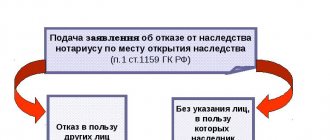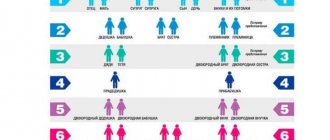9
Inheritance of citizens' property occurs after their death. Beneficiaries are usually close relatives. An exception is the alienation of property by will. The testator can change the composition of the applicants and the size of their shares in the inheritance. If necessary, the testator has the right to deprive one or more heirs of property. You can disinherit the beneficiaries of a will by challenging the document. However, this method is not suitable for legal successors. Let's look at how to disinherit an heir by law.
The essence of the deprivation procedure
Disinheritance is a legal mechanism that allows you to deny heirs the right to receive property after the death of the testator. Disinheritance may be a direct or secondary procedure:
- Exheredation (direct disinheritance) is the denial of the right to receive property to direct heirs through the provisions of a will.
- Secondary dispossession is a procedure for declaring legal heirs unworthy (under sufficient circumstances). The procedure is carried out during litigation (the proceedings are initiated by other heirs or government agencies).
Grounds for disinheritance
To disinherit potential candidates for heirs, it is necessary to officially recognize them as unworthy. The reasons for implementing such a procedure may be as follows:
- It is possible to recognize an heir as unworthy if a citizen has committed intentional criminal acts against the testator.
- The citizen committed deliberate criminal acts in relation to other heirs in order to receive the entire inheritance.
- The heir is recognized as unworthy if it has been proven that there was an attempt to seize or falsify the will, or in any other way interfere with the implementation of the will specified in the document.
- In 2021, a fairly compelling and common reason for deprivation of inheritance is deprivation of parental rights.
- Failure of the heirs to fulfill their obligations to support the testator may be considered as a basis for deprivation of inheritance rights. In the latter case, a compelling argument will be the existence of an agreement between the heir and the testator. Such an agreement regulates the standards for providing the testator with the necessary care (for example, delivery of products, medications, care, and so on).
Disinheritance of heirs by law
To disinherit heirs by law, it is necessary to file a claim in court. Such an appeal can be considered as an addition to the criminal case (when a crime has been committed or an attempt has been recorded).
Attention! Need a lawyer's protection? in the form, go to the page for free questions for lawyers , go, free !
After filing a claim, the interested party is obliged to collect a significant evidence base. It should be noted that there is no point in litigating the fact that there is a court verdict in a case whose circumstances are directly related to the inheritance. A court decision in itself is recognized as a sufficient basis for deprivation of inheritance.
It is possible to disinherit an unworthy heir both before accepting the inheritance and after:
- If the inheritance has not yet been accepted, interested parties have the right to contact a notary’s office and provide grounds for excluding a citizen from the number of applicants (a court verdict or court decision may be considered as a basis).
- If the inheritance has already been received, the situation will be much more complicated. In accordance with current legislative norms, in 2021 the heir is obliged to return all property received during inheritance. The person also undertakes to return the benefits received as a result of the ownership of the inheritance. If the property was sold, exchanged or donated (actions were taken as a result of which the return of the property mass is impossible), the unworthy heir is obliged to compensate the value of the property at the time of opening of the inheritance.
Is it possible to lose the right to an obligatory inheritance share?
In accordance with Part 1 of Art. 1149 of the Civil Code of the Russian Federation, the share of the testator’s property must be allocated:
- children of the testator who at the time of his death have not reached the age of majority;
- adult children of the testator who are officially recognized as disabled due to health conditions or physical or mental development disorders;
- parents of the testator who have lost their ability to work due to disability or reaching retirement age (this rule also applies to women over 55 years of age and men over 60 years of age);
- disabled citizens who are dependent on the testator.
These persons will receive the part of the property due to them even if they are not entitled to anything according to the will. The only basis for removing them from inheritance is recognition as unworthy heirs (Part 4 of Article 1117 of the Civil Code of the Russian Federation).
From the general provisions of the Civil Code of the Russian Federation and the IC of the Russian Federation, it follows that under no circumstances is it permissible to deprive children under 18 years of age of an obligatory share of the inheritance. Firstly, they have not yet reached the age at which full legal capacity begins. This means that their parents, guardians or guardians are responsible for the actions of minor children. Secondly, even if a minor citizen aged 16 to 18 years has acquired full legal capacity in accordance with the norms of the Civil Code of the Russian Federation, the Family Code of the Russian Federation establishes a more lenient legal regime for them. Consequently, it will not be possible to exclude them from the inheritance even if they commit a deliberate act that formally has all the signs of a criminal act.
By law, incapacitated adults are not responsible for their actions. Guardians are entirely responsible for them. It is easy to understand that incapacitated heirs will also receive their share in any case (and their guardians will be required to perform all legally significant actions).
How to inherit an inheritance for a minor child
Disinheritance by will
The testator has the right to deprive potential heirs of the property mass under the will, without regulating his own decision on any grounds.
The document represents freedom of expression. The testator has the right to indicate by name all potential heirs and possible next heirs, and then declare that he is depriving them of the right to receive the inheritance (the reasons and grounds for such a decision are not indicated).
By means of a will it is impossible to disinherit only persons who have the right to receive an obligatory share of the inherited property:
- The rights to receive a compulsory share are reserved for the disabled parents of the deceased. The exception is that parents have been deprived of parental rights. If the decision to deprive parental rights was not canceled before the death of the testator, the testator's parents are automatically excluded from the number of heirs.
- Inheritance rights are reserved for the disabled spouse (a wife or husband can be considered obligatory heirs if they were officially married to the testator).
- Persons who were dependent on the testator for at least a year before his death. These citizens can be both distant relatives and persons who have no family ties with the testator, but had the only source of livelihood in the person of the testator.
Who cannot be disinherited
When drawing up a will, the testator is prohibited from disinheriting citizens who are entitled to an obligatory share of property:
- young children;
- disabled parents;
- disabled dependents;
- disabled spouse.
If the order does not take into account their interests, then it is considered invalid. It will not be difficult to challenge such a will.
Disinheritance of heirs' compulsory share
Is it possible to disinherit compulsory heirs? The circle of persons claiming obligatory shares in the inheritance may inherit a reduced share or be completely deprived of the inheritance by a court decision. To cancel the mandatory share, the following factors are considered:
- Specific property is considered as an inheritance.
- The heir under the will exploited the property while the testator was alive.
- The obligatory heir, on the contrary, did not use the property of the testator.
Features of obtaining a guaranteed share
In the absence of a will, the property passes to the obligatory heirs in equal shares according to the legal principle. Legal successors submit applications to one notary office and wait until the end of the six-month period. Then the rights to the received property are registered.
A will represents a person's last will and is drawn up by a notary. A person has the right to personally indicate candidates and determine the shares of property that they will receive. The document drawn up must not violate the rights of compulsory heirs. Depending on the situation, the following solutions to conflicts between legal successors are possible:
| Situation | Solution |
| Received a smaller portion of the inheritance | Other heirs will make up the difference or give up their share. |
| The legal successor is not specified in the will | The legal part of the property will be formed by reducing the shares of other legal successors. |
| The testator did not indicate all of his property | First of all, the compulsory heir will receive a share of the unclaimed property. If it is not enough, then the difference is compensated by the property specified in the will. |
Heirs protected by law must remember that encumbrances are also transferred along with the inheritance. The debts of the testator will have to be paid by the legal successors. State duty is also paid by claimants of the deceased's property.
Disinheriting children
It is possible to deprive the property of first-priority heirs (children, spouses and parents), regardless of their number. All children born to the testator are equated to heirs of the first stage, and they can be deprived of the inheritance mass as follows:
- A son or daughter can be left without inheritance by specifying other persons in the will. If the testator's children are able to work, healthy and of age (at the time of opening of the inheritance), they will not receive anything.
- Regardless of the order of the marriage, the testator can deprive the children of their inheritance by drawing up a will.
- After the death of the testator, recognize the son or daughter as unworthy heirs.
- During the life of the testator, all property was transferred to the children from the new marriage (in this case, the children from the first marriage will not receive anything).
Children who have not reached the age of majority cannot be disinherited. Even if a will is drawn up or the property is bequeathed to third parties, minor children will be allocated a share of ½ of the legal estate. It is almost impossible to recognize children as unworthy heirs (due to their age).
The only way to deprive children of the inheritance is to issue a deed of gift for all the property to an outsider or sell everything, having managed to spend the proceeds.
It should be noted that the descendants of an heir legally deprived of the inheritance by the testator do not have the right to use the mechanism of inheritance by right of representation. This norm is regulated by Article 1146 of the Civil Code of the Russian Federation.
Author of the article
Dmitry Leonov
Work experience 15 years, specialization - housing, family, inheritance, land, criminal cases.
Author's rating
721
Articles written
712
about the author
Useful information on inheritance
- Entry into inheritance
- What documents are needed to enter into an inheritance?
- Inheriting an apartment
- Inheritance after the death of a relative
- Mandatory share in inheritance
- How to register an inheritance
- Certificate of right to inheritance
- Establishment of the fact of inheritance and recognition of property rights
- Restoring deadlines
- Opening time and place
- List of documents for opening an inheritance case
- Refusal of inheritance
- Application for acceptance of inheritance
- Selling an inherited car
- Opening an inheritance case
- Inheritance after wife's death
- Joint inheritance
- Escheated inheritance
- Documents for registration of inheritance
- Inheritance after mother's death
- Inheritance after the death of a husband
- Inheritance after the death of parents
- Registration of inheritance for an apartment
- Inheritance after father's death
- Protection of inherited property
- Division of inherited property
- Documents for inheriting an apartment
- The procedure for inheriting an apartment by law after death
- Inheritance of a non-privatized apartment
- Inheritance of a privatized apartment
- Application to establish the fact of acceptance of inheritance
- Inheritance without a will
- Limitation period for inheritance cases
- Application for inheritance
- Valuation of a plot for inheritance
- Disinheritance
- Car valuation for inheritance
- Inheritance by adopted children and adoptive parents
- Inheritance by right of representation
- Inheritance after the death of a son
- The procedure for inheriting cash deposits
- Inheritance of land plots
- Inheritance of loan debts
- Inheritance of unpaid amounts
- Actual acceptance of inheritance
Legal assistance
Inheritance cases are considered quite complex, despite the relative simplicity of the legislation and detailed explanations of the Plenum of the Supreme Court. Therefore, legal assistance should not be neglected, especially if a dispute is brewing.
Of course, a notary provides basic legal assistance by virtue of his powers. But the notary has no right to resolve any conflict and, moreover, make a decision to remove the heir from the inheritance. This means that you will have to go to court. And here, without a lawyer, it will be difficult to substantiate the claim, draw it up, and even determine jurisdiction and the list of requirements for the claim.
Due to frequent updates to legislation and the legal uniqueness of each situation, we recommend obtaining a free telephone consultation with a lawyer. You can ask your question by calling the hotline number 8 (800) 555-40-36 or write it in the form below.







